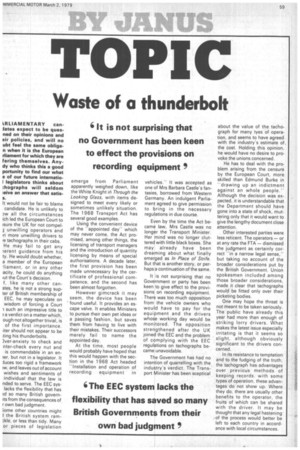TOP C
Page 61

If you've noticed an error in this article please click here to report it so we can fix it.
Waste of a thunderbolt
1RLIAMENTARY canlates expect to be quesfled on their opinions and eir policies, and will no ubt feel the same oblige
n when it is the European rliament for which they are fering themselves. Anydy who thinks this a good portunity to find our what e of our future internatio1 legislators thinks about ;hographs will seldom eive an answer that satiss.
It would not be fair to blame candidate. He is unlikely to 3w all the circumstances ich led the European Court to isure the UK for not compel] unwilling operators and .n more unwilling drivers to re tachographs in their cabs. He may fail to get any lerent guidance from his ty. He would doubt whether, a member of the European -liament, or in any other ,acity, he could do anything
■ ut the Court's decision.
f, like many other canates, he is not a strong supter of British membership of EEC, he may speculate on wisdom of forcing a Court -1 such an impressive title to ; a verdict on a matter which, ough not altogether trivial, is of the first importance. ,iter should not appear to be .ting his thunderbolts.
)ver-anxiety to check and nter-check every nut and is commendable in an en;er, but not in a legislator. It Juces too rigid a framework and leaves out of account wishes and sentiments of individual that the law is nded to serve. The EEC syslacks the flexibility that has :d so many British governits from the consequences of r own bad judgment.
iome other countries might I the British system ram:kle, or less than tidy. Many or pieces of legislation emerge from Parliament apparently weighed down, like the White Knight in Through the Looking Glass, with items designed to meet every likely or sometimes unlikely situation. The 1968 Transport Act has several good examples.
Using the convenient device of the "appointed day" which may never come, the Act promised, among other things, the licensing of transport managers and the introduction of quantity licensing by means of special authorisations. A decade later, the first provision has been made unnecessary by the certificate of professional competence, and the second has been almost forgotten.
However gimcrack it may seem, the device has been found useful. It provides an escape valve. It enables Ministers to pursue their own pet ideas or a passing fashion, but saves them from having to live with their mistakes. Their successors merely fail to name the appointed day.
At the time, most people would probably have hoped that this would happen with the section in the 1968 Act headed "Installation and operation of recording equipment in vehicles." It was accepted as one of Mrs Barbara Castle's fantasies, borrowed from Western Germany. An indulgent Parliament agreed to give permission to bring in the necessary regulations in due course.
Even by the time the Act became law, Mrs Castle was no longer the Transport Minister. Her mind was no longer cluttered with little black boxes. She may already have been dreaming about what finally emerged as In Place of Strife. But that is another story, or perhaps a continuation of the same.
It is not surprising that no Government or party has been keen to give effect to the provisions on recording equipment. There was too much opposition from the vehicle owners who would have to pay for the equipment and the drivers whose working day would be monitored. The opposition strengthened after the UK joined the EEC and the problem of complying with the EEC regulations on tachographs became unavoidable.
The Government has had no intention of quarrelling with the industry's verdict. The Transport Minister has been sceptical about the value of the tachograph for many tyes of operation, and seems to have agreed with the industry's estimate of the cost. Holding this opinion, he would have no desire to provoke the unions concerned.
He has to deal with the problem arising from the censure by the European Court, more skilled than Edmund Burke in 'drawing up an indictment against an whole people.'" Although the decision was expected, it is understandable that the Department should have gone into a state of shock, muttering only that it would want to give the lengthy document close attention.
Other interested parties were less reticent. The operators — or at any rate the ETA — dismissed the judgment as certainly correct "in a narrow legal sense,'' but taking no account of the broader considerations put by the British Government. Union spokesmen included among those broader considerations, made it clear that tachographs would be fitted only over their picketing bodies.
One may hope the threat is not meant to be taken seriously. The public have already this year had more than enough of striking lorry drivers. What makes the latest issue especially irritating is that it seems so slight, although obviously significant to the drivers concerned.
In its resistance to temptation and to the fudging of the truth, the tachograph has advantages over previous methods of keeping records. with some types of operation, these advantages do not show up. Where they do, there are usually other benefits to the operator, the fruits of which can be shared with the driver. It may be thought that any legal hastening ,.of the process would better be left to each country in accordance with local circumstances.












































































































